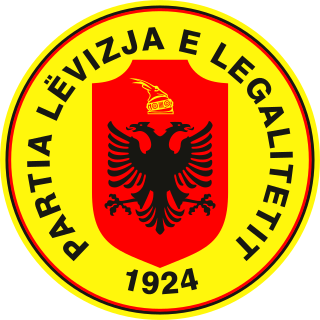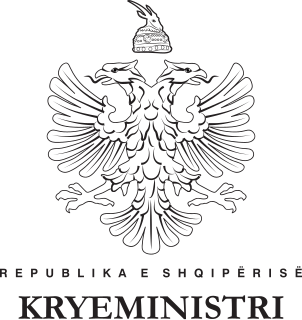
Zog I, King of the Albanians, born Ahmet Muhtar Zogolli, taking the surname Zogu in 1922, was the leader of Albania from 1922 to 1939. He first served as Prime Minister of Albania (1922–1924), then as President (1925–1928), and finally as the first and only King (1928–1939).

The President of Albania, officially styled the President of the Republic of Albania, is the head of state, commander-in-chief of the military and the representative of the unity of the Albanian people.

The Legality Movement Party (LMP) is a right-wing monarchist political party in Albania, led by Sulejman Gjana. It supported the return to power of the House of Zogu under Crown Prince Leka of the Albanians. In the 2001 elections it was part of the Union for Victory coalition which received 37.1% of the vote and 46 members of parliament.

While the medieval Angevin Kingdom of Albania was a monarchy, it did not encompass the entirety of the modern state of Albania. The latter has been a kingdom on two occasions. The first time was after it declared independence in 1912.

Prince Leka of Albania is the only child of the first Leka, Crown Prince of Albania, and Susan Cullen-Ward. Prince Leka was an official at the Albanian Ministry of Interior and in the past has served as an advisor at the Albanian Ministry of Foreign Affairs and Presidency. The prince is referred by some Albanian monarchists as King Leka II since the death of his father, whom they referred to as Leka I. On 30 November 2011, he succeeded as head of the House of Zogu, titular King of the Albanians upon the death of his father.
Parliamentary elections were held in Albania on 3 July 2005. The result was a victory for the opposition Democratic Party (PD) and its allies, prominently the Republican Party (PR). Former president Sali Berisha became prime minister as a result of the election. Voter turnout was only 48.0%.
A referendum on restoring the monarchy was held in Greece on 3 November 1935. The proposal was approved by 97.9% of voters.
A referendum on becoming a republic was held in Greece on 13 April 1924. It followed the catastrophic outcome of the Asia Minor Campaign. As a result of the military defeat, King Constantine I was forced to abdicate in favor of his son, King George II. King George himself later went into exile in Romania, the home of his wife, while the government debated the fate of the monarchy. Ultimately, a plebiscite was called. This referendum, following the restoration of Constantine I in 1920, reflected the see-saw nature of the Greek electorate and the then-present dominance of the Liberal and Republican Venizelists in Greek politics and abolished the Crown. Prime Minister Alexandros Papanastasiou favoured the vote for the Republic, while Venizelos kept a neutral stance.
The line of succession to the former Albanian throne is an ordered list of those eligible to succeed to the headship of the Royal House of Albania, grand mastership of the dynastic orders and ascend the throne of Albania in the event the monarchy is restored. The native monarchy of Albania was deposed in 1939. The current head of the royal house is Leka (II), Prince of the Albanians.
A referendum on retaining the monarchy or becoming a republic was held in Norway on 12 and 13 November 1905. Voters were asked whether they approved of the Storting's decision to authorise the government to make the offer of the throne of the newly self-ruling country.
Tati Essad Murad Kryeziu, Prince of Kosova was the heir presumptive to the throne of Albania from the creation of monarchy on 1 September 1928 prior to the birth of Crown Prince Leka on 5 April 1939.
In 1991, the Socialist Party of Albania, with specific social democratic ideology took control of the country through democratic elections. One year later the Democratic Party of Albania won the new elections. After 1990, Albania has been seeking a closer relationship with the West. What followed were deliberate programs of economic and democratic reform, but Albanian inexperience with capitalism led to the proliferation of pyramid schemes – which were not banned due to the corruption of the government. Chaos in late 1996 to early 1997, as a result of the collapse of these pyramid schemes, alarmed the world and prompted the influx of international peacekeeping forces. In 1995, Albania was accepted into the Council of Europe and requested membership in NATO and is a potential candidate country for accession to the European Union. The workforce of Albania has continued to emigrate to Western countries, especially Greece and Italy.
Parliamentary elections were held in Albania on 24 June 2001. The result was a victory for the ruling Socialist Party of Albania, which won 73 of the 140 seats, resulting in Ilir Meta remaining Prime Minister. Voter turnout was 53.6%.
Early parliamentary elections were held in Albania on 29 June 1997 alongside a simultaneous referendum on restoring the monarchy, with a second round of voting for 32 seats on 6 July. The elections were called as a response to the 1997 Pyramid Crisis. The result was an overwhelming victory for the opposition Socialist Party of Albania, which won 101 of the 151 seats. Voter turnout was 72.6%.
Parliamentary elections were held in Albania on 22 March 1992, with a second round of voting for eleven seats on 29 March. The result was a victory for the opposition Democratic Party of Albania, which won 92 of the 140 seats. After the election Aleksandër Meksi became Prime Minister and Sali Berisha became President.
A constitutional referendum was held in Albania on 7 November 1994. Voters were asked whether they approved of the new constitution published on 6 October, which would have given more power to the country's President. However, it was rejected by voters, with just 43.6% in favour. Voter turnout was 84.4%.
A constitutional referendum was held in Albania on 22 November 1998. Voters were asked whether they approved of the constitution. It was approved by 93.5% of voters with a turnout of 50.6%, and came into force on 28 November.








